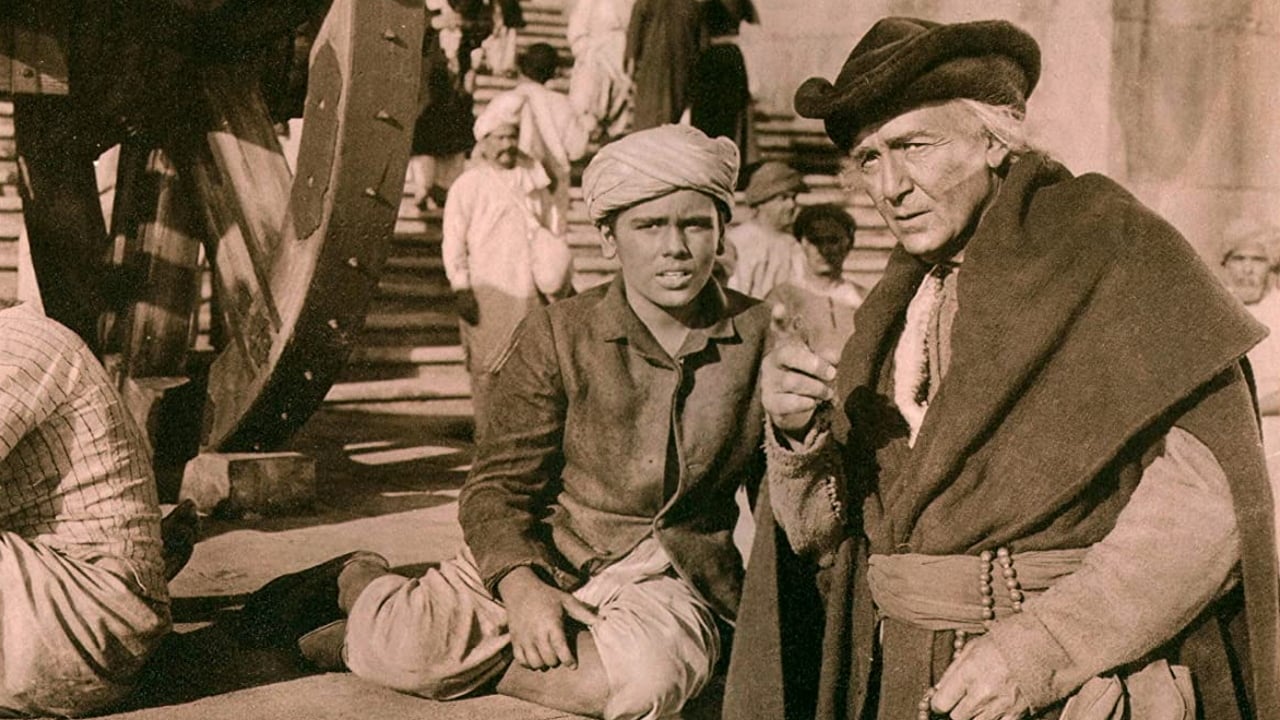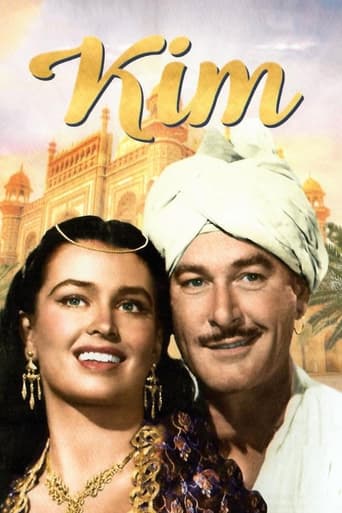

During the first half of the twentieth century, many Americans loudly proclaimed their opposition to European colonialism, rather hypocritically given that the United States would not have existed without the colonisation by Europeans of the North American continent; all that happened in 1776 was that control of that process passed from the mother country to the settlers themselves. The American cinema, however, often took a sympathetic view of the European colonial empires, particularly the British one. " Kim" is a good example; although it was made in 1950, three years after Indian independence, it nevertheless reflects the nineteenth-century British view that the Raj was a Jolly Good Thing.The film has been described as a "Boy's Own" adventure story. ("The Boy's Own Paper" was a British boys comic noted for its adventure stories, often with a distinct patriotic bias). It is set in British-ruled India during the 1880s. The title character is Kim O'Hara, the orphaned son of a British soldier, who becomes involved with the British intelligence service as they try to frustrate the attempts of Russian agents to foment rebellion amongst the frontier tribes. (No doubt in the early days of the Cold War American audiences would have been receptive to any story featuring Russian villains, even if the action took place during Tsarist times). In the course of his adventures Kim befriends Mahbub Ali, a Lahore horse trader, and a Tibetan lama whose disciple he becomes.Visually, the film is attractive; no expense seems to have been spared, as much of the action was shot on location in India. (Many films of this period got no closer to the country where they are ostensibly set than a Hollywood backlot). It does, however suffer from two major flaws. The first is miscasting. Young Dean Stockwell as Kim plays his part well enough, if one can overlook his American accent, but receives little support from the other leads, especially Errol Flynn as Mahbub Ali.By the early fifties Flynn's career was in decline. He had suffered from various health problems, including alcoholism, and no longer possessed the charisma and athleticism which had first made him a big star in the late thirties and early forties. He was, however, still regarded as a big name, and was presumably cast in this film on that basis, but makes little effort. This must be one of his laziest performances; he didn't even telephone it in but posted it by second-class mail. To make matters worse, he is totally unconvincing as an Indian, and receives no help from the makeup department in this regard. Mahbub seems so European that I kept expecting him to be unmasked as an Englishman in disguise, something which never happens. Although it transpires that Mahbub is working for British Intelligence, we are supposed to accept that he is a genuine native of Lahore.The film's second major flaw is that it never manages to integrate its religious themes with the main story. I have never read Kipling's novel, so cannot say if his mixture of mysticism and adventure works well on the printed page, but it certainly does not succeed on the cinema screen. The scenes with the lama seem like a distraction from the main action. It doesn't help matters that the Hungarian-born actor Paul Lukas is no more redolent of the mysterious East than is Errol Flynn. His lama dresses like a Catholic cardinal and in his bearing recalls a mild-mannered Anglican clergyman. Overall, "Kim" is one of those fifties adventure films which have not aged well and which retain little interest today. 5/10
... View MoreThis is a nice version of Rudyard Kipling's notorious India tale, adapted in Hollywood style by Victor Saville and set in 1880s. Along with ¨Courageous captains¨, ¨Jungle book¨, ¨The Elephant boy¨ are the Kipling's most known adaptations. Kim(Dean Stockwell) is 15-years old boy posing as vagrant native , but he's actually son of a English sergeant. He's living on his own resources when finds a monk Lama(Paul Lukas) , a holy man. Kim is looking for a red bull an the Buddhist Lama on search for a river where Budda hurled an arrow becoming itself a sacred place. Kim also befriends an Afgan horse dealer named Mahbub Ali (Errol Flynn) . Later on , Kim is trained by English secret service(Arnold Moss) as spy. Then Kim receives orders of a Brit colonel(Robert Douglas) for a daring mission.This rousing adventure film packs emotion, feats, thrills and agreeable performances. Stars Paul Lukas does a magnificent acting as spiritual monk but is Dean Stockwell as the rogue waif , in the title role, who steals show. Although relies heavily on the enjoyable relationship between the protagonists , nevertheless the film is very amusing, providing some intense action scenes and lots of excitement. Enthusiastic supporting cast from Robert Douglas, Cecil Kellaway, Thomas Gomez, Laurette Luez and Reginald Owen as Father Victor, among them. Glamorous cinematography in glimmer Technicolor by William L Skall . Filmed on location in Rajasthan,Agra(India) and US, as Lone Pine, Alabama Hills, Sierra Nevada mountains of California and with production design by prestigious Cedric Gibbons and Hans Peters. Stirring and exotic musical score by Andre Previn. The picture is flavorfully directed by Victor Saville. Rating : Good and nice, it's an exciting family fare. It's remade for TV(1984) in an inferior version directed by John Davies and starred by Peter O'Toole as Lama and Blayr Brown as Ali.
... View MoreI saw the movie just after I had read the book and I realized that while some dialogue was copied verbatim, the end had been changed and the character played by Erol Flynn was given a greater role than in the book while the importance of some female characters that existed in the book was actually obliterated. Of course the movie cast the English as good and the Russians as bad as the book did and had all the trappings of the mythology of British imperialism as it would have been obvious in a book based on a Kipling novel.But the experience of watching it on screen was fine, since the movie had simplified some of the more esoteric meanderings of the book focusing on action or on the making a man- Kim- that is in character building, as the moral was that an essentially kind-hearted but mischievous oriental had to acquire the manners of an English gentleman-the role St Xavier's was preparing him for, and which he found difficult to follow-but at which he returned in the end through the guidance of the horse trader, a model of faith to the British. The role of he Lama was downplayed in the sense that the actions of his that the movie retained were only the ones that related with Kim's development as an individual and not the ones that had to do with his own spiritual quest. In the book, the Lama is just after Kim the second most important character while in the movie he is overshadowed by the horse trader played by Erol Flynn.Also importance is attached in the training Kim received in order to enter British Intelligence, an ambition that judging from the movie seemed to be what natives considered a crowning achievement. But still it is an enjoyable movie provided you agree with it's premises i.e. that the east is the playground of Westerners whose ways the natives would do well to emulate as Kim did or otherwise they would appear at best as well meaning but essentially exotic eccentrics as the Lama, or otherwise as dangerous criminals as all the opponent of British rule appeared in the film. The movie is really fun if you are a young westerner or someone who in latter life still retained this outlook but I suppose the same prerequisites apply to all Kipling's work- original or subject to adaptation.
... View MoreI have always felt that among the child actors who managed to maintain their careers into adulthood, Dean Stockwell has been one of the best. He certainly is able to handle any role - he was the more sympathetic one of the two child killers in COMPULSION, and he played the amorous crime boss in MARRIED TO THE MOB. He even was Howard Hughes in TUCKER. His early films showed great promise too. Besides the one I am about to review, notice THE GREEN YEARS and THE BOY WITH GREEN HAIR and THE SECRET GARDEN. KIM gave Stockwell more than just a chance to play the central figure in a film. He was playing in a colorful background (India in the days of the British Raj in the 19th Century). He was sharing the central stage with one of the great film stars of the 1930s and 1940s (Errol Flynn). And he had a chance to play in a movie based on a classic story - Kipling's best remembered novel.Kimball O'Hara is half Anglo-Irish and half Indian. His father has been dead many years, so he lives with his mother's people on the streets of Calcutta. It is about 1885, and while the British are running India, memories of the atrocities of the Indians against the British (remember Cawnpore - see the review of Flynn's THE CHARGE OF THE LIGHT BRIGADE), and memories of British retaliation against the Indians (such as tying Indian rebels to cannon mouths and blowing them apart) have poisoned the relationship quite deeply. Moreover, the Russians are active in the subcontinent supporting rebellion and dissent. He finds a pair of substitute father figures. One is the Hindu holy man, the Lama (Paul Lukas) who is seeking a final pilgrimage in his life to a holy site. When Kimball is identified as the son of a former army officer, Colonel Creighton (Robert Douglas) takes him off the streets, and puts him into a school. His learning is difficult (there is an amusing sequence where we see Kim cheating all the time, not realizing his pragmatic approach to learning is not what is expected of him). Eventually Creighton puts him in the hand of the spy-master Mahbub Ali (Flynn), who becomes the second substitute father while training him in intelligence gathering. The novel goes into great detail about this - called by Kipling (and ever since) "the great game". Kim is trained to react to stimuli as though he has a photographic memory: he can look at a bunch of seeds or jewels once and rattle off how many of each there are.But although he is patriotic, and follows the orders given from Creighton to Mahbub Ali, Kim remains deeply faithful to the Lama. Mahbub Ali sees this as an unexpected advantage: Kim can go undercover accompanying the Lama on that pilgrimage which goes towards the Russian Indian border (near present day Packistan and Afghanistan). So the novel (and the film follow Kim and the Lama on the pilgrimage - and show all the color and diversity of that remarkable subcontinent. It does not fail to continue the espionage, with Kim learning what is going on with the Russian agents (and relaying the information to Mahbub Ali, who is following from a distance as a back-up). But the crisis in the story is which of the two distinct missions of the two distinct father figures will get the upper hand in Kim's mind. And how will he balance them out?I won't go into the final details - the audience will not be disappointed by the resolution. The end result is that we do see a young, happy, care-free little boy turn into a thoughtful teenager preparing for manhood. Stockwell's performance was a very good one, abetted by Lukas as a simple and good man, and Flynn as a craftier one, but one who does keep a close eye on his apprentice "son". And the canvas of India won't disappoint at all. Definitely a film to watch.
... View More